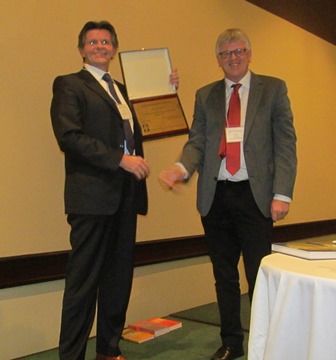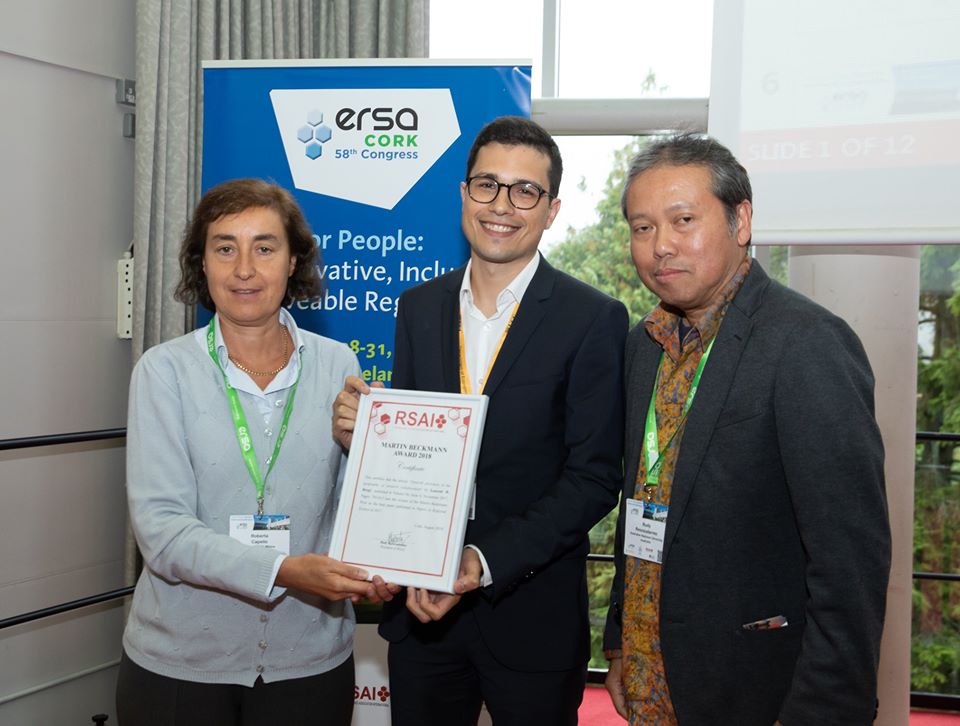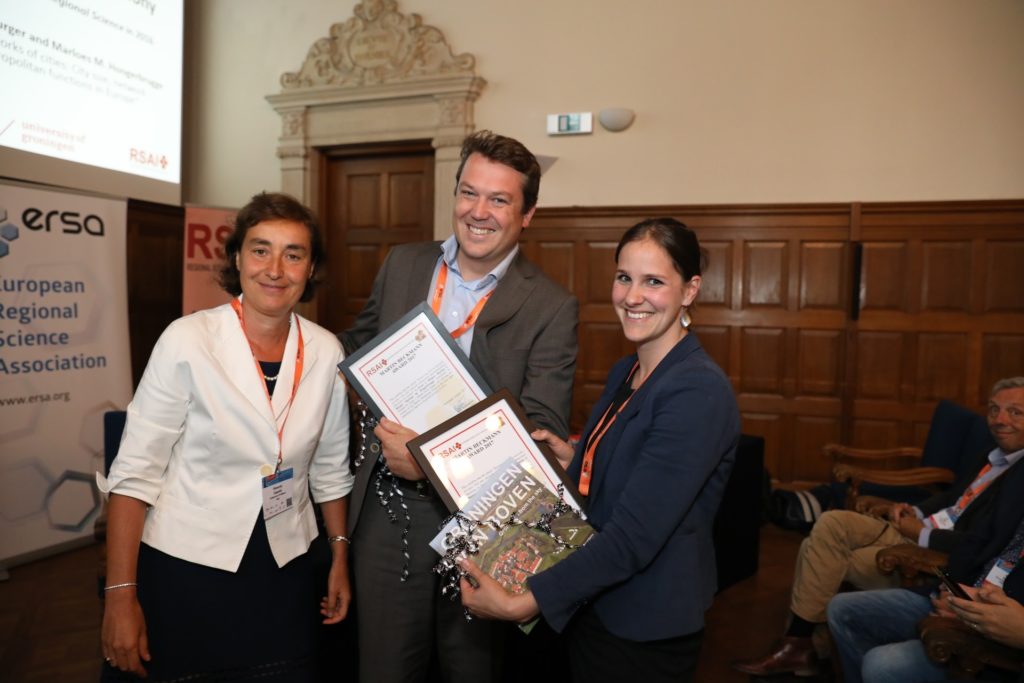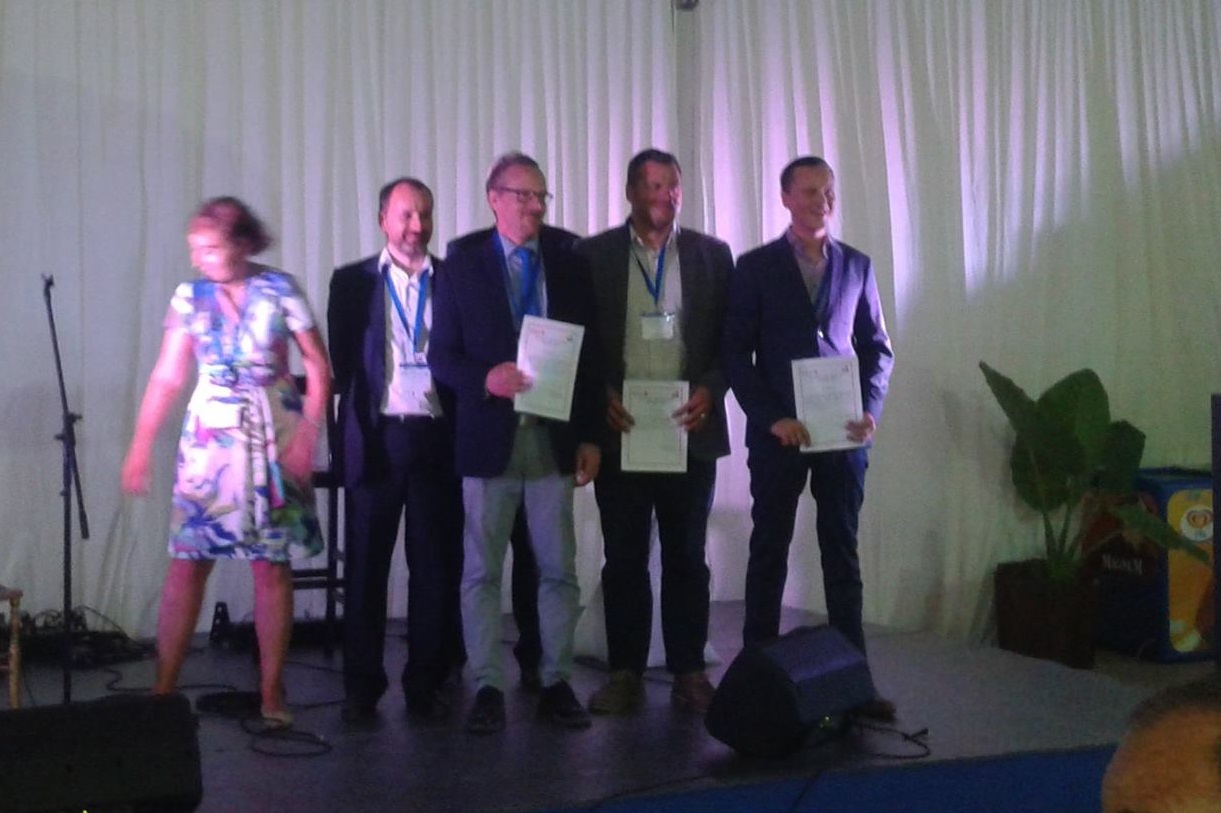The Martin Beckmann RSAI Annual Award for the Best Paper in Papers in Regional Science
Winner 2024
RSAI has the great pleasure to announce that the jury consisting of Carlos Azzoni (LARSA), Janet Kohlhase (NARSC), Frank van Oort (ERSA) and Rosella Nicolini (ERSA, PiRS EiC) chose the article:
Vicente Rios, Mercedes Beltrán‐Esteve, Lisa Gianmoena, Jesús Peiró‐Palomino, Andrés J Picazo‐Tadeo (2023): Quality of government and women's political empowerment: Evidence from European Regions, Papers in Regional Science vol. 102, issue 6, pp. 1067-1097.
Motivation:
This study proposes a novel contribution that shifts the research frontier of the literature on the quality of government, from a regional perspective, by emphasizing the relevance of the gender dimension. Referring to European regions, the authors produce valuable insights endorsed by precise quantitative evidence on the extent women’s political empowerment rises the quality of the government that, in turn, boosts female empowerment. From a technical viewpoint, this contribution implements a solid research methodology that addresses endogeneity with a tailored identification strategy by exploiting GS3SLS-RF method and dealing with spatial analysis in a causal framework.
as the winner of the Martin Beckmann Prize as the best paper published in Papers in Regional Science in 2023.
Previous winners
2023 |
|
The jury consisting of Budy Resosudarmo (PRSCO), William Strange (NARSC), Isabelle Thomas (ERSA) and Rosella Nicolini, EiC of the journal chose the article: Jhorland Ayala-García and Sandy Dall'Erba (2022) The Impact of preemptive investments on Natural disasters, published in Papers in Regional Science, Volume 101, Issue 5, Pages 1087-1103. Motivation: This study delivers a very original contribution to the current and relevant debate on the role of institutions and public policies aiming at contrasting the socioeconomic impact of natural disasters on citizens’ life. The authors implement a precise research strategy approaching physical geography to regional science. They exploit novel and original data combining satellite information with public finance data for Colombian municipality and propose different indicators for approximating the market and non-market losses of landslide-related events (associated with extreme rainfalls events due to climate change). The empirical analysis relies on a robust IV approach building on a very attentive selection of covariates fitting the proposed indicators. The conclusion is a direct message to institutions and policy-makers demanding effective measures to protect lives and assets of the most vulnerable population. as the winner of the Martin Beckmann Prize as the best paper published in Papers in Regional Science in 2022. |
2022 |
|
The jury consisting of Roberta Capello, Randal Jackson and William Strange chose the article: The persistent pay gap between Easterners and Westerners in Germany: A quarter-century after Reunification, Heather Dickey and Alessa M. Widmaier, published in Volume 100, Issue 3, 2021, Pages 605-631 Motivation: This excellent contribution tackles two relevant orders of questions: the sources of the wage gap between East and West Germany and the wage differentials within the two regions. Unlike much prior work, the convergence process is considered up to the present in order to understand the persistence of the regional wage gap. One of the salient results of this publication is that part of the wage gap within the former East Germany remains unexplained. The conceptual framework is solid and the problem is situated beautifully in the relevant literature. The analysis is innovative and thorough, and the writing exceptionally readable. as the winner of the Martin Beckmann Prize as the best paper published in Papers in Regional Science in 2021. |
2021 |
|
The jury consisting of Janet Kohlhase, Dan Rickman and Jouke van Dijk chose the article: Optimizing entrepreneurial development processes for smart specialization in the European Union, by László Szerb, Raquel Ortega-Argilés, Zoltan J. Acs, and Éva Komlósi, published in Volume 99, Issue 5, October 2020, Pages 1413-1457. Motivation: Through an elegant scientific approach, the paper demonstrates how the Regional Entrepreneurship and Development Index (REDI) can be used to optimize local entrepreneurial discovery processes, in a manner which can support smart specialization strategies (S3). The analysis clearly demonstrates that without optimizing the entrepreneurial ecosystem, the industry specialization alone may not be successful because of the inability of the ecosystem to nurture high growth ventures. With its results, the paper strongly suggests that regional improvement can be achieved by reinforcing the weakest features of the local entrepreneurial ecosystem, an important suggestion for the successful implementation of a smart specialization strategy. as the winner of the Martin Beckmann Prize as the best paper published in Papers in Regional Science in 2020. |
2020 |
|
The jury consisting of Janet Kohlhase, Dan Rickman and Jouke van Dijk chose the article: Quality of government and regional resilience in the European Union. Evidence from the Great Recession, by Roberto Ezcurra and Vicente Rios, published in Volume 98, Issue 3, June 2019, Pages 1267-1290. Motivation: Through an elegant scientific approach, the paper examines the relationship between quality of government and regional resilience in the European Union during the Great Recession. The results show that the quality of government is an important factor when shaping the regional reaction to the crisis. The analysis clearly deonstates that higher quality of government is associated with greater regional resilience over the Great Recession. The paper gives emphasis to the role played in this context by spatial spillovers induced by the quality of government in neighbouring regions, which turn out to have an important role. as the winner of the Martin Beckmann Prize as the best paper published in Papers in Regional Science in 2019. |
2019 |
|
The jury consisting of Janice Madden, Carlos Azzoni and Erik Verhoef chose the articles: Institutions vs. ‘first-nature’ geography: What drives economic growth in Europe's regions?, by Tobias D. Ketterer and Andrés Rodríguez‐Pose, published in Volume 97, Issue S1, March 2018, Pages S25-S62; Motivation: Through an elegant scientific approach, the paper aims to investigate whether differences in institutional and ‘first nature’ geographical conditions have affected economic growth in Europe’s regions in the period 1995–2009. The analysis lies on a newly developed dataset including regional quality of government indicators and geographical characteristics, and arrives to the conclusion that regional institutional conditions – and, particularly, government effectiveness and the fight against corruption – play an important role in shaping regional economic growth prospects. and The continental divide? Economic exposure to Brexit in regions and countries on both sides of The Channel, by Wen Chen, Bart Los, Philip McCann, Raquel Ortega‐Argilés, Mark Thissen and Frank van Oort, published in Volume 97, Issue 1, Special Issue: The trade, geography and regional implications of Brexit, March 2018, Pages 25-54, Motivation: The paper tackles an important topic like Brexit, and studies the degree to which EU regions and countries are exposed to negative trade‐related consequences of Brexit. We develop an index of this exposure, which incorporates all effects due to geographically fragmented production processes within the UK, the EU and beyond. The paper demonstrates that UK regions are far more exposed than regions in other countries and that this imbalance may influence the outcomes of the negotiations between the UK and the EU. as the winners of the Martin Beckmann Prize as the best paper published in Papers in Regional Science in 2018. |
2018 |
|
Motivation: Through an elegant scientific approach, the paper replies to the questions of how network proximity influences the structure of inter-regional collaborations and how it interacts with geography. A new, theoretically grounded, measure of inter-regional network proximity is introduced. The paper achieves interesting results, revealing that inter-regional network proximity is important in determining future collaborations but its effect is mediated by geography. Most importantly, a clear substitution pattern is revealed showing that network proximity mainly benefits international collaborations. Based on the originality of the interest in the topic, and the important results achieved, the jury concluded that the paper was the best published one in 2017. |
2017 |
|
Motivation: Through an elegant scientific approach, the paper interprets the contrast that exists between the current dynamics in the Western European urban system and the bourgeoning literature stressing the importance of agglomeration for economic growth. The papers argues that rise of ‘city network economies’ leads to processes of borrowed size as well as the rise of agglomeration shadows in networks of cities, and finds that network connectivity positively enhances the presence of metropolitan functions, even if local size remains the most significant determinant for most types of functions. Based on the originality of the interest in the topic, and the important results achieved, the jury concluded that the paper was the best published one in 2016. |
2016 |
|
The jury consisting of Antoine Bailly, Masahisa Fujita, Roberta Capello and Erik Verhoef chose the article "Fiscal decentralization and regional disparities: The importance of good governance" by Andreas P. Kyriacou, Leonel Muinelo-Gallo, Oriol Roca-Sagalés, published in Volume 94, Issue 1, Marh 2015, Pages: 89-108 as the winner of the Martin Beckmann Prize as the best paper published in Papers in Regional Science in 2015. Motivation: The paper deals with the measurement of the role of government quality in mediating the relationship between fiscal decentralization and regional disparities. The paper, based on evidence from a sample of 24 OECD countries over the period 1984 to 2006, provides support to the idea that fiscal decentralization has the potential to reduce income differences across regions but that this potential may not be realized because of governance problems associated with sub-national authorities. Based on the originality of the interest in the topic, and the important results achieved, the jury concluded that the paper was the best published one in 2015. |
2015 |
|
Motivation: The paper deals with the estimate of the respective importance of spatial sorting and agglomeration economies in explaining the urban wage premium for workers with different sets of skills. The paper is an innovative piece of work in the complex field of identifying the sources of differences in wages among cities. It provides empirical evidence on which type of skills are rewarded by density, and bear on the broader question of the contexts in which agglomeration is important. Based on the originality of the methodology used, and the important results achieved, the jury concluded that the paper was the best published one in 2014. |
2014 |
|
The jury consisting of Masahisa Fujita, Antoine Bailly, Roberta Capello and Erik Verhoef chose the article "Measuring the effects of European Regional Policy on economic growth: A regression discontinuity approach" by Guido Pellegrini, Flavia Terribile, Ornella Tarola, Teo Muccigrosso and Federica Busillo published in Volume 92, Issue 1, March 2013, Pages: 217-233 as the winner of the Martin Beckmann Prize as the best paper published in Papers in Regional Science in 2013. Motivation: Based on the originality of the methodology used to develop a very important topic, and the important results achieved, the jury concluded unanimously that the paper was the best published one in 2013. It deals with the the assessment of the Regional Policy effects through a non-experimental comparison group method, the regression discontinuity design, and a novel regional dataset for the 1994–2006 period.The paper is an innovative piece of work in the complex field of regional policy evaluation. |
2013 |
|
The jury consisting of Masahisa Fujita, Jean Paelinck, Roberta Capello and Jouke van Dijk chose the article "Social networks and regional recruitment of foreign labour: Firm recruitment methods and spatial sorting in Denmark" by Torben Dall Schmidt and Peter Sandholt Jensen published in Volume 91, Issue 4, November 2012, Pages: 795-821 as the winner of the Martin Beckmann Prize as the best paper published in Papers in Regional Science in 2012. Motivation: Based on the criteria a. originality of the topic b. theoretical foundations c. appropriate methodology and d. empirical relevance the jury concluded unanimously that your paper was the best paper. It examines the interesting and complex issue of social networks in regional recruitment and inflows of foreign labor. Using both cross-section analysis and panel data analysis in Denmark, the paper successfully shows the importance of regional social networks and spatial sorting in the recruitment and inflows of foreign labor. The paper is innovative in empirical study on a new and complex issue of international importance. |
2012 |

The jury of the Martin Beckmann Annual Award for 2012 consisting of Jouke van Dijk, Masahisa Fujita, Jean H. Paelinck and John M. Quigley selected for the Martin Beckmann Prize 2012 as clear winner Michael Fritsch and Holger Graffor the paper "How sub-national conditions affect regional innovation systems: The case of the two Germanys", published in Volume 90 Number 2 June 2011 as the best paper published in Papers in Regional Science in 2011. Motivation: The paper by Fritsch and Graf represents an innovative empirical research on regional innovation systems RIS). In comparison of two RIS in East Germany with two RSI in West Germany, with careful study of characteristics of the inventor networks within and surrounding the four RIS, the paper convincingly demonstrates that an nalysis of RIS should account for the (sub-)national economic conditions as well as for the region's position in its spatial environment.The paper will contribute significantly to the empirical and theoretical study of RIS in the future. |
2011 |
|
Trade costs in empirical New Economic Geography Maarten Bosker and Harry Garretsen Volume 89, Issue 3, August 2010
Akihiro Otsuka, Mika Goto and Toshiyuki Sueyoshi Volume 89, Issue 4, November 2010 |
2010 |
|
Thomas Scherngell and Michael J. Barber Volume 88, Issue 3, August 2009 |
2009 |
|
Good governance, trade and agglomeration Fabien Candau Volume 87, Issue 4, November 200 |
2008 |
|
J. Paul Elhorst and Annette S. Zeilstra Volume 86, Issue 4, November 2007 |
2007 |
|
Empirical growth models with spatial effects Bernie Fingleton and Enrique López-Bazo Volume 85, Issue 2, June 2006 |
1. Goal
The Award recognizes annually a regional science scholar or scholars who have demonstrated innovation and excellence in Regional Science research through the publication of a paper of outstanding merit in Papers in Regional Science.
2. The Award
2.1 The award is established to recognize and honour the outstanding career and contribution of Professor Martin Beckmann, an internationally recognized regional scientist and economist of outstanding merit, and who is a foundation fellow of the RSAI.
2.2 The Award is made annually for the best paper published in the Issues comprising an annual Volume of Papers in Regional Science.
2.3 Normally no more that one paper may be selected from an annual Volume of Papers in Regional Science, but in exceptional circumstances two (2) papers may be selected for the Award.
2.4 A paper selected for the Award must demonstrate innovation and excellent in research in regional science.
2.5 The Award carries a cash prize of the equivalent of 500 pounds sterling.
3. Jury and Process for Recommending the Award
3.1 In the first quarter of each year, the three (3) Editors of Papers in Regional Science will convene in person and/or by email and /or by teleconference to review the papers published in the Volume of Papers in Regional Science in the previous year and choose a short list of up to five (5) papers which they deem as suitable for consideration for the Martin Beckmann Annual Award for the Best Paper in Papers in Regional Science.
3.2 The Editor-in Chief of Papers in Regional Science will then send the papers for appraisal to a Jury comprising the Editor-in Chief and three (3) Fellows of RSAI chosen by the Editor-in-Chief of Papers in Regional Science in consultation with the RSAI President.
3.3 The Jury will appraise and rank the papers during February that year, and in March a meeting of the Jury will be convened by the Editor-in Chief of papers in Regional Science (meeting in person and/or by email/teleconference) in March to select the paper or papers to receive the Award.
3.4 The Editor-in-Chief of Papers in Regional Science will inform the Executive Director of RSAI of the decision of the Jury, and the Executive Director of RSAI will inform the recipient(s) of the Award.
3.5 The Awardee(s) will be invited to attend one of the Supra-Regional (NARSC, ERSA, PRSCO) meetings or the RSAI World Congress to receive the Award.

 The jury consisting of Janice Madden, Carlos Azzoni and Erik Verhoef chose the article "
The jury consisting of Janice Madden, Carlos Azzoni and Erik Verhoef chose the article " The jury consisting of Janice Madden, Carlos Azzoni and Erik Verhoef chose the article "
The jury consisting of Janice Madden, Carlos Azzoni and Erik Verhoef chose the article " The jury consisting of Antoine Bailly, Masahisa Fujita, Roberta Capello and Erik Verhoef chose the article "
The jury consisting of Antoine Bailly, Masahisa Fujita, Roberta Capello and Erik Verhoef chose the article "